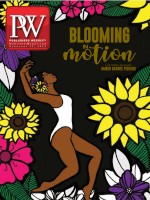Rather’s bestselling essay collection What Unites Us gets a graphic adaptation (First Second, Mar.), bringing his reflections to a new audience.
You ask the big questions but also get right into the details—is that the old journalist coming out?
I think it is very much the journalist in me coming out. I hope not with any arrogance or conceit I can say I’ve been lucky to have more than my share of stories and travel and experiences to talk about. The whole idea of the book was not to provide answers but hopefully to start a conversation. I’ll give one example: patriotism. People talk about patriotism lightly and politely but what is it? How do you think about it? That’s what I was hoping the book could get people talking about.
How did you approach working with the illustrator on drawing these abstract concepts?
I was so unaware of what a graphic novel was, for the visual part of the book we depended almost entirely on [artist] Tom Foley. I can be dumb as a fence post about a lot of things, but I was at least smart enough to realize that in engaging this whole new graphic idea I had better listen carefully to the people who knew what they were doing and knew how to do it.
You quote Elie Wiesel: “We must always take sides.” Is it possible for Americans to take sides and still find the unity that you’re talking about?
I think it’s very possible. I am basically an optimist by experience and inclination. But I’m not fuzzy-minded that everything’s going to be all right. We have to make it all right. We’ve got some hellacious problems.
You describe the country you grew up in as a lot less free than it is today in terms of equality. How were you able to write a book that includes the truth about America’s past while keeping a sense of idealism?
We have to come to grips with the past. The country’s not capable of being perfect but we can be a whole hell of a lot better. That requires us not to deny the difficult things in our past, beginning with most importantly racial injustice. Then we have to keep endeavoring for a more perfect union—not that it’s ever going to be perfect, but struggling to make it more perfect—moving closer and closer to it.
Would you say that America is a work in progress?
Yes, it’s always been a work in progress. We started the book with a quote from Alexis de Tocqueville who said, “The greatness of America lies not in being more enlightened than any other nation, but rather in her ability to repair her faults.” I think we’re at a period where we need to recognize our faults and get busy repairing them and move on to higher ground.



 Volume 268
Issue 8
02/22/2021
Volume 268
Issue 8
02/22/2021





